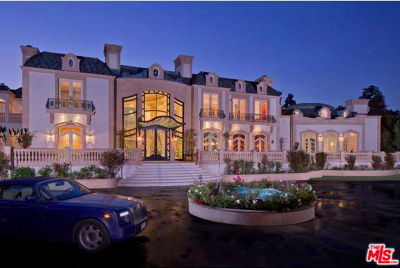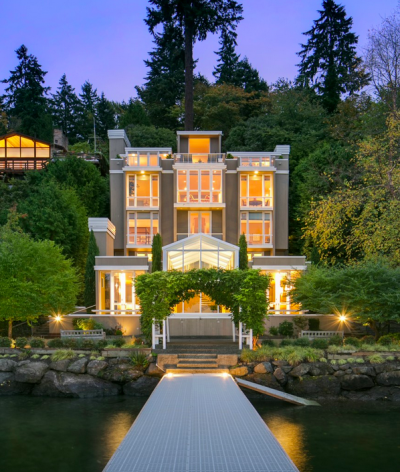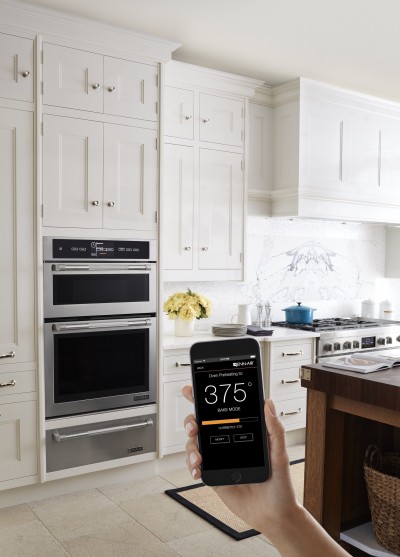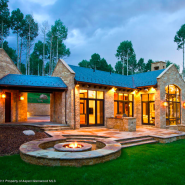Once thought of as a luxury, smart homes may comprise most homes by the end of the year, according to a new report by Coldwell Banker Real Estate LLC.
The year 2020 has long been the benchmark for the smart home to go mainstream, but 45 percent of all Americans already own smart home technology or already plan to invest this year. Although the technology has long been expected in the luxury segment, new opportunities continue to open.
"In the luxury segment, the smart home is not becoming expected – it already is expected," said Danny Hertzberg, sales associate on Coldwell Banker's Jills team, Miami. "People question any new construction that doesn’t have smart home features, it’s just expected. And even in the mid-market price range, smart home technology is starting to become more expected. So there really is a shift."
"The Coldwell Banker Smart-Home Marketplace Survey” was conducted online from Oct. 22-26, 2015. Data related to age, sex, race/ethnicity, education, location and income were weighted in accordance with the proportion of the broader population.
Get smart
Of those who already have smart technology or plan to buy it this year, over one-third say that they are not early adopters of technology. Those who already have it say overwhelmingly that the next home they purchase will also have it.
Additionally, more than half of homeowners say that they would install smart home products if they believed it would sell their home faster. Given that 70 percent who currently have smart homes say their next house will also be connected and the rapid rate of adoption, it stands to reason that outfitting homes with the technology will indeed lead to a quicker sale.

Coldwell Banker home listing, Beverly Hills, CA
Asked what makes a home smart, common replies were security such as locks and alarm systems (63 percent), temperature control (63 percent), lighting systems (58 percent) and safety features such as smoke detectors (56 percent), with 60 percent saying that a home needs three categories to be “smart.”
Cited less often but already popular among smart home owners is entertainment systems, namely televisions and speaker systems. Forty-four percent of people with smart home technology already own at least one smart entertainment product, compared to just 31 percent and 30 percent who own smart security or temperature, respectively.
"Homeowners across the board are thinking about smart home technology," Mr. Hertzberg said. "We’re seeing that regardless of age and regardless of price point there’s an interest.
"Homeowners of all types are savvy, and they’re looking for a way to improve their lives and make their lives easier," he said. "Smart home technology has become affordable and accessible, and that’s why it’s going mainstream so quickly."
Smart home technology is no longer solely for the affluent. A quarter of those with incomes between $50,000 and $75,000 are adopting it. Additionally, costs often hover around the $1,500 or $3,000 price level, a negligible impact for luxury homes.

Coldwell Banker Bellevue, WA real estate listing
Still, smart home technology is clearly on the minds of consumers, meaning that realtors and brokers should keep it in mind when helping clients find homes. Although the cost of the technology has made it far more accessible than it was a few years ago, all consumers, not just young consumers, are looking for it.
Indeed, although only 25 percent of millennials own smart temperature products, 40 percent of those over 65 do. Recognizing what type of smart technology different consumer groups will want could go a long way in making a match.
Get smarter
Smart home technology may be going mainstream, but luxury brands are going the extra mile to push it forward.
Appliance maker Jenn-Air, for example, is currently showing technology that will outfit home kitchens with appliances such as connected wall ovens. Residents will be able to control the convection ovens from their mobile phones.

Jenn-Air connected wall oven
Often times, smart home technology extends to what can be done to the home from the outside.
For example, U.S. electric automaker Tesla is going the extra mile in the name of convenience for its consumers.
Evolved Vehicle Environments Inc. (EVE) has used the latest technology to launch EVE Connect for Tesla, connecting the car with the home for the safety and convenience of the driver. The technology gives Tesla a unique advantage that will appeal to everyone from younger tech-savvy consumers to parents (see story).
A number of trends beyond smart homes are growing in importance to homebuyers.
Among the emerging trends in luxury real estate identified in a recent report from Wealth-X and Sotheby's are environmentally friendly homes. Features such as solar power, geo-thermal heating, rainwater collection system renewable materials and touch technology are particularly important to younger ultra-high-net-worth consumers.
The market has been quick to respond all over the world. LEED-certified homes on the U.S. market were up nearly 10 percent over the last year and double that in Canada, while BREEAM-certification rose over 14 percent in the United Kingdom with increases in green homes throughout Western Europe as well. In China, government incentives have spurred a 19 percent increase in environmentally friendly construction (see story).
"Brokers and agents need to be experts – and not just when it comes to comparables and contracts. We need to know what buyers are looking for, and that’s smart home technology," Mr. Hertzberg said. Brokers need to be a guide for the buyer. They need to be able to really understand smart home technology so they can explain to buyers how they can unlock their doors from their phones, or change the temperature from their couch.
"When it comes to agents, the consumer is very savvy, so the agent doesn’t want to be in position where he is confused by a request about smart home technology," he said. "The agent should be the expert, guiding the buyer to the smart home that’s the best fit."
Final Take
Forrest Cardamenis, editorial assistant on Luxury Daily, New York
{"ct":"q3Gi52N1DOgvWUDac2HAF22IFciwQf3l0WqzvF3l6L7v+e+eC4FdWmjjKqxXR6YBJgLo5CfVGrCKN2G4XdisOrOrgbLkI8ExSJAnVMCdZksqbQq\/q\/aeilddpnEFsF85kfeMOwmaK5Xn4hNpqSF4wN1wGc4tmvYOUyQ4I7IyYqzzffqtOi+mrH+8Nqs0yrYiTIfTb0Tb0egPdXP+YrAAHKU4r13VO1wv7UjtLyDll7cH02ZLCk8zjiYJknhlPCzxX1bJ1lJbVq9snrZ5pql1IZYYaAJf25jr8ecFl08+iKLjIPmRF+cK5JznrRA3PQVJwnSNwJvssXKJUcQ+gbSTAIgZgwzmWYnEE8yONSINftH4epLSjUDjNfZWBcdpYrVeVa4ALsGpMl4hy0UQKMOwceeR6DU8SIBOWm+cGPg9dnKwi+pvJVmP0WPxAqthuhBgaNdk04sT2puIZ82F+4tCY9sTzUopv5ZCBLQ3\/WZye0Y1\/R1SiL+rNdTbnTRLwGJa8bquRap+FJ9UDMLVm0iLr\/MQvRxrUR7gq6CZPlIuG0y3pMU8AeYoLb3NDyBRhpaDww1xmPLtWu7mWMg2LEmyqwCQT0Qu8TbZiXk3BHqPRU6Mo03bazQJIRBz8xW4olqkWtIVjt6RZnqxb7Jh8GQ0xGlw8KQU07pKyiCpLhj9VNio4zPWNeV0RMYgADY6Z93VSWzaSEVE1df0FQeCGya6kBiCun1WRdj5xI12D4j0jQMJ\/FcbpbjfHi\/UpdaSee63I9JgQfhyEknuTn0LsI7XItwFN\/vsKqyGZND9IFea8TtSv5mEKCZicNuZ1eHoxFl7wk4sJF7PsTVVrIqPhNmLGHOHZDWZy7ZsNZoC3VppHceXYND2whMGZTe8sSLDb7Xu1fWTFt5YGZofOJovNsb9twLvVKfSl5EVftv2sfkH7+xvUUyec+VLJ32IQmiUP\/g\/grXzZ9tnnfrmFD+yDL82k\/\/\/VTpLva6lCFHuYkN7MC\/5Gb8T3fG4qtDhcM17EHqo8LuFF8hKJ9itZ0hkZrdHJG1V2CbvWsTyrRg3VCZMzBfJHdgpSZMYf7Sf6UA7uYOL1S+Fi+5IpdrQYxLolEtlCIvWfGaOMr\/0m8Pj3QAp7Rk\/XHPfSp9t\/JUwvpnivZgN0pDyqC\/JypzxckxJy2fa8shpIol2en\/vmwnLGNsZVeEDfxOkw1tEOmA8\/mvrOrB58W5XaV1GL3UXLOZapc31BtIBl46cERFYogGioBQ9VRZl0n9l50TRVXVeTi0PPNQ8s3uj5fl4Hp2AjgjnF204liaR1RqkQKh3qD2Zk7GpezK7IhLRKnYoai7KWdcVKB9ahdHdkgxOO+7OezemFnX7TYsC+0MXc\/RXe579OV4xZeB0tP9kt4KCi+4k0a7U\/mBZMrtVoiaXspTAsgqex8F5O+cL+x7rwa8BNEC41FCOixbvYw47KAGK6SovDtNwEa3+JocSJmY0FRtj5ifcSxbkAWI9GlJMHon2lDZKywMF9HJBnNxfaKlbEAuKUs+TghMYu+Y0H22Uxx34CQVvUtq7LtB1zzFOishlTRaVPe7RB1ZfqhUNa\/qyREo9fS+4b94YharzRYuMk8NSUBO8jpSRd9oUH3W71RCi4\/ekSAZrtDYawumVAZmmdS4Ar6Kw1MMm1w3aYGkMPiEfgi2eEL19lJxbNwrBUHXmTKlvY49seqG5DJ2gDjPg64JHNSlimJ0WP8hIOEGJxLODwhtI5rYnNmUjgiWpIbi3zIO2hAlGvjVV\/QA5Eq+HrZAyEN594Z7Mf0TAy2uwLRZvjXrnBB25AwISNawz2Zoz9KbWMvSWevnaOnkXg\/oi54JWa1x9+sncesBOh22hfrz\/57WDph88M\/dl56fiELJbI2Byt9rx9e2PmNLJbMsQeExvc0iP0qCJgrm1ZkRQDk6qf1MQVyts2mlViv2tIwJMUwWxeSVKP0br01m78hqhbdDFaidUwg+Grh4Op38qz2gptIu2uDohk0vwchS8k\/hFp09KRn79YxtAODJo58NkJGHHlittxbJGTDuq8HcjSVIBOWdTiCDXoi8MnS+9RirqNHtOP0a+\/2wsuxuEI\/6SbODhGdaqUelI5ABwnac6SrE7159n2eroGYjqSLCGz5RvDpRXyJ3qEvKVl5b1N2mY2a8WedH2++neqaUELdeZXAqmzJdU83pwpLESTlQu53mWEHxUFBw0SlU07q\/Q634JIIKAc9xhcG6bgKoUMzPMdQYNsrBZ0+75Ql1Y4zaVkiSf2k1TUiwc8DxrYFTmNxMCX3r8mawOZVcWMIZ0MOG7Rd12LHxP\/pR170OlVQ8DcvIwPKZ1tFUCABMtGicrSceGrc+6MqY6ZUSEMM2TzK\/t3jFMxySI9pFVS05Ldzwu0tZTntMGqeoc\/zMwnrL9YL+4PwSF4mrIxs5t4lp3Wp2w2J80SHCyhHySNB6AcyCruoqlfdKFekxhQz1IrN62W1NrFYKkYE3srnOCuyQzOLGvUZH3KEp5lln+SqdyApetor+x0U7fkm2ZleVQXeT3+r62qrj4otvExohLu\/AR2lmoEdDyh6XSs4Xvkm0+cE0ErDpzXnXMbd+10ibwoM0c\/M3czp9XPdcURu+7FW7UvXQ3Znkfz5Jm\/vZckVRVYy\/9xcpbMfNLvPKnlLs9mInoD\/eX0d8uQqjO03Bwa\/5Zm\/TYdCtJmY54gNNAhv80dT1ygLxuSl5Kc\/FgNQLpAFJi3Rjic6H04HHCOKe1P35CgjF1kmDvBWYGs\/XRCh9bZWMtqno4TnLAdQ5m33jpf1CGx16t0LJSP1DDlU+TPKE4qWZW3aroHmx7Dmpur2KnJlRz04dZ3uVdiE1lMAGRIa9FRxr9VLcSGyOUK3PRhZiCG4LqYKC9eHVbh51d5xdZM6qmuQgJA2X7ClEUUKrfgEKhGjn3ucOkntn6wujB0mMPwo13fi1I8IhK0NNfPGZZNm+nwO75FcsOvvz+NBIeRmPKDZXrghQpJ4JshCDh+tpL5lFaq5v4m6R\/GjzSuYYlN26\/JXX8WlqXK6spD7C8EaSWdFCSqYtkUdBq+bdH+v6CqGG7ocRY7z\/xilUPtG8b4vhLGbV6gAx\/x+EUT7KCws1OKQsuC4pBx4rbcBajs4k1V2SPWAvZ8P51N01Z2\/\/FgdlfAlTtIyE80r3tjrAStqVmJ03Sdi7\/EBjKaMTLd96Y\/xffvzkYkk+1kjEpPNdbY+oJNMNr3HzYwoGx8YC3\/\/Ss4smDrmj1gv4QbgW7MTjqhfmxw+Ag2zKJDSV6iF2jF9KBuyhy4HF0HqVMfP+ZUi24wzv9k\/8aTstp\/i5VQwxF2YgRDI5l3zLAJ09W+0QItLy0ofgMqJ4SfQlxFmeJlfqNmpbaufd9IsUg0p5gkmcb1rl62vKf5j0rygIqEI1ejrObT53MT6lSHC1RH88480B4RjUZAGfJIpV50TknEZp8xPgvSqSt0RZxHpSDqfVTIsKVcWCxOPKYTfZssZoaXEQztAlHDzgNKHGAJS75swSoug+osyOdp4kX+q9z2MeKP+Wez1lEoijlpIHMZAJzuhVHp9Sm\/3RydTZDV3yZ9VlnsMDZx8ytSZ8w\/gaB07qJceKtna\/Az837E3VblOl6\/oK81UfzNu\/vTE\/YqhC+ou8wZRG7VnnQquYI1JufWu43VWtdRH1VOpx\/1MlG9v3xHJBiXkaJ7i1zOW2c29a5rKorYOHSeJUiZ5GbVP0FiIUrgJhjC9vFsx8T1fWoXNDMLtkBbsCMq87jgCxprlvrCsKC6Sb3+Xowcea9DlUnjJ8gJ+yaMhou70VmWXXf5q+xtIXGL6bzq2RgheqpuMaASUWazQbjqPgYYoQrAa5GIIycasU7ceidslb8WTymWUpS++qH7NYiqMXvnFl599uzkvJlCGrN5To9FTcVVCB6qbUYnYWh2zPCe96tB+s1TZVKKicSGI8jEB1x\/cykT3ja+PTvuvplEjjibV3io6xrr4DD2XUc0Nb556OXGKKgku\/Se7tlgBEORMDNna6rmTY05MzolRP3tmokEkfFHQ+\/ub0oCmRWWyz3MaDC8vKwee40STpSBXLtpyXZ9MOOUHL8VY6rhK2CF\/uuOwDdVbnYcfPe6nkDJxwrMQaxoPASkC4z35FOQaIEzjwnWjHMryHo+A6UNcLrRsBUpy025roT1pHpw3Zm5Y6f6UvI9z0bCN279pYCM3UnL1iHD7+uc267wYxn4q21DZGdWuSnVxb45XNnpZ1w3j\/fqhnbJ0k2KSA6\/0Yf4WX4qSTyZRsQCgSdfUxr0P4S6bqmb3qCvfD5kF0+P6mcjEcGwR303bxMR6nL2wR84WkFfJtMehshGCiaAmllC\/ZTv6RtG46lB+yw50U1k2dYY6PDvmC3Hg1YAdVzHXnoQitz4WMexW8PPMOBVfYq0MsyttJp8xwE9xAXdcrsgCu1tZ+U9FKQiOISmDgT2FKnMd9zpEpiAkcae7u\/qlitu\/qkah47CNAVK9725UueyQuaMqc8ucPFqYC6qoH3xiH0EesxhVRRojBNj6fsLFl+Paoj325LgFAH6zZ6ujYvKgh3VpLWKfk0PiRYIH\/Ll990zJTNnI5eJOpWeftpSsKUPTkPYvHQ8O8J0upf2L7L9VedYJG7\/u+M7pyEV8AINwwGb2tfqRxbVISEutA4uio7Cy6gKmXYc\/iMoCXXoc8zJUlXct2p4zCdOIOTs2Uka65VlZENEqY8bvUb+cR9nF1hv8EGGAvmOmxWk19fodB+o6cI8uqmDGkpt8smPkOx\/QhMilP7x8M+y8FwBDrgJL7aBi4LRYVdetNJO\/G2zOSyNwasmY0VPUdQOWamqPH8ygiFnjE67oY6THxjFTj7K9cxhP6T79fIO5+Wa8sXnsvmFh1Qj1asg6lYfm4GQTMaXXjuCPojTnIW3NkfL+MHyLuwWWvQr91xArT4J+JmhWJSNMiiewftvkr5fOhjpeGt3mAratNGAaXMOrJvna0LYRHPB4FF4\/LkqqFxcL8edzuSMI8rXc5twf2TvDOf8cMNTZnthn4IV3LGrUFrtU4JPVhLgGELsq\/RnnXMxr7IpC2GNlRVQwIaH2pRZATGzL2feH+fCtP29zDqc8VGa4BwmrqrMKKpTXWxDN00WYAg63o\/5LnICpWbjUiLVWBgEoPtq7CJcyM9n7ony4dklmvv7eiQ6h1GMOYtWnLTGLVxr+zd89YVwqG6LAbAborWU5aGWgX+DlSb4lDNYIWWMjH2FvcS9tqEfTRxwQRb48cCQPM177KU6jeB9A97sUhF0kXnmINPpy5hDSF0kWmOezhhgD2gnnYZKbLo2P\/2uqFyubE2Fdf2zhURH+SYKbWBGJsaJcNihu+6W7mwmnKadgjnYiM7JAQUA5QqLqprwuqvmPqsAD8wu7wDA55ce44HjzbX2PRC3PXxeEbbrmDlzcs0LOQdfIgxXtN6tUxchsmZP77VbL8KtEjeGsJkj41OZfLdGMsx8OxAZheqk3RmvKd7bs2Xw3Iv\/IjODwFfB8EeXEBK4qJ0iswII49Gz+bEZ5h9RGr8GEl4qjDMe9HjkbqnYy4XUsvZEYFjwM\/Y+ktDiCXePT1AlMksgDkm0pt\/Uq6RHZxqRJpgsUSzq3k+Loz1o31nl4V\/UVBh77HGDQd2WF5y0s4P+BWYaKdgP\/zK\/jobcWOW5+wnH4oiDrwsZChS6sBDN67EUNDc3gfHLHAOs58cr6Iij\/CE1FYvchBl4WS8hH9+gfSHjMGJllei18nPlwAr7+h9siNZaKdp3DDY0e9hquFBrSjCar1a87mrxwa8f6T8aN0RoP74I6mRwQ0Z43FmZ3\/RU2M2ynMDRVK9\/GAjBiNGJ1ftR0TcokjtE7X2oI7yXwG\/JqY84fP9F1llAgiPnt260PPpuftimviQxaaMFugEUE9oEhR2AGFEXVe\/JRbcre5p2eU9irS4akLjmpKlwvkCMbyuU9lhddf+m0I+Zu4n+hv89eyyXPgrX\/YFpEFMZyGq1mWq31E0sHLPXBnlDBHBdctorcNzR3mgad+wGe5DShBVPEPSLZ0WwVW7\/yT\/Mbok9Ozd4x6KmfJlN20VVZ9qgsrw5DHrHHTX7tYxN96w1je1zno1kDdSS\/FebJdZSpioUA2jRWyvAJE9NLJnTkMziQDSdG7HbxdLQWLVO8WN76dwLGuQXuqOe+MmY\/neYlFa7ZKv17IIYoLxnFP9+AS5oS\/r7\/wwK8\/Jcy8jw9+OxFRGwyXAHICcW2AnqQBGk87QVmUBgCRUMuZBAmGtGLe8FIPWtXlk7\/+j74LdOADIPvn4uQov1w+vHVotKOqQgJ5CTFLdG4eIVjViyHL2y9yEuSSDmS66ZplPznyFXJ20EFmBCaQHTtyDCqTxzwCjFfZDY9IMkaKRHfpZAgqBsa+9fTLbEI0Ck9Kp7bW7nwnUopkgXrEAN6L1L4ffnsE4JvjO\/77dvJPmiYAolGylJNzCeT5Yv07wMUK8vFitnWxVUMw2Xih79sUTEbuzchWw1uq+raaD9HwogwovO9Ixf7ir7zRS5Kv1+O13oBbyjahoywLDwmhGT1RMlombrJzcR8rOKkC1OvCXDkOEY9e\/A7Y48vBZwelou9m\/6pcOm2dBMn8MzkRV1OCzE186zuJb3cTqgbznZ82ZK\/HBkfNRl2mh5hpP7+JGCdOx52EtMfPtKZYJ9strpFs\/Ae2s2YaEh+d7m1hIpEMFygwwScaXrWR+5+lGI+NyA\/Honel6U8gvQglNFGXPNaVnsJA11yLhsu5uuX0BS7LDyp7ovIxn7RRi28Q7u0MKfM9GhIGI76AZJLcG9s0mDRbvk2ivCZYECL4mGow+BG8SoSvkYtQAuobuxhU3eAR0s82ZWNwOeME3a1\/hz+wUzWsqC7AHfDqcZKrGro37ayh5O40HUQDjgigUBjeN2MF8TtUWCx5CcNsRhqK0C7WVVkt92pwpu3TNY65KB3Lnw\/m7Zi1F35ptjM4QwEu3JW+rDJItcNtRGtPnaOPBWNi7xE3FPPwFJNxrPW0rUPP3dneADzOkOD4hVHtkbCqUunei3SKqx6F2UI8ypZTAUm\/2StOS5jaGq0uo5JYWS3u2G04+N1blnKoD+zLUDtYsHMy3jNTkyptqfNpCk\/L1ZgX76sgAkpoScQHPLIDxoH8qBRtkTvx3NuZCOJWmeSQ5wdYFS4WwM2i2JEgXUMxwDnAp6c1F+qBls0ctgaTLTHFy0I6ekVjx0dCtLBna7xuy\/t3Tkeg1vW7CmzrCYEvILwTazKdOPk0bdR0zusR6ZLrQ8EMYfmGh6WQp++QbeFDxbKuFpfyKcUPmaNZZHybrq1dGO4ctcEP0xLg6w9nEzmvtcvWkKZSebu+vGuY6JkSmmUR1ASa62eN9CbrlyHq\/6nlRWj7VX+7tSYcRswVuYPnmbvDrq+RQgGhB9NHzrzzloBM4+myuPhhSV4lZOn17jMvxkBo0QwSmRVpqBE41ZxqF\/Vv5SSxG20UPlzUjQZz4L2znWaKzC3XSpULXxQ0l3RMv2EAph9FeA2z7CtxJKl2Ib5uVcSGaXs468KcTp93O2tsk1MJOCG4KxYidwXN22zLet5BhedqkG3igd5i8KLJkWmqfbfYlVEOTjwY5U6ET3HF+LMYc2aW1ZVR2GPQYOn6dNc40q6t7WSm+Eu9oF33zC4ZLoKTqgGu9qZEHMFZngppF26GQnJ26HCselxXXfH6\/wCilJS5F9adggI1JSGbIst6wvaRHfsIdRph7lFwjTOaCaiCJdsVTwSs4TCKm7ijT0KxATTWLD4O7eSvOC6Jdb15c6eaEj5Jfyiuzu0MI5v5DZeYyqQZtbbNHfm9AD796pYxlLk+R3\/tpr6QQ113cIuC5yqQu9kuZsTWj8d4TpoB4ibcTe\/igzb9JcBqjUXTRrd+Q3NVz8FsmtELv1MX0EyVyurc9PDT+cOrkMtiBIbD2SfYZPRsLe5oZpN6C5W5Z0V14JftpGLHM56fhHiZs77PY9lcnt5pvj2DZF9\/\/d34Hf\/+SiCFuBcI8IsdjknL09szQqiOBwgYyEAaL0xIpn1+rg8T9mtvURFEaLcm1WJgr\/5+gXJ5RoPbueuUbVJsGRgRQ5LUQMgflASMtBZ\/vBApaHkyzwP4ENyZcjBrBz3vZoBHIodlWcZIuwVy9OGOT+4Mv1l3YrDOodTQoq+ggkF+srEPOaYZvJEbABPkCDPmtlX8uK\/BS2XyWaxbwjd8pYnektvCKnnbAVTvxW2WHQa\/aQK3pR0A8AUD34aqOhk2wJEJpY07XlM6GDZ0lJyAXvTo2pTp3bIAtqLxIK7soM4QGsYLLXRNflDRAUdB9hIy8avBhBjlloEflnefyNxBcym+nF8whsWR9duxQb1sGJHQcYWNI+1F63NNAH13gioTnSMqzT8q4VaM0RmtRej4+VVUqO5NKyPZCEjc9tQoPD1HIpDL+smAw4EXL45k0H\/F1BNkM1DbfNsEWa\/40pSKd3iU0t4IgABdehnC7cPtoqsQ9mTmf7YzEdnA6ISrRsip7SUuy955oC9awPD3L+90Ovel9UnSLSOinQ8HUMKMSEc\/VLcHLb0siNHgh32e43FoYtGZuBHLkaYfPbBj68fM5NrpmBwAqMTZ7D9deLlQCtCr5FZXcqJgD59ed8u+Yew27zx794XjyySRQFMqQ2dSR5WnbD2JUkMhtXR8bY6sUsx3GUYjEvFhzT5JjCCUxMqVmcOeZENdBVZxwk\/F2TiBB3uFZOef2owyx+F7W1iwYzJxvWUosTFfTDsmV\/4yuNwVOLW8ftApfndU8N58prNa7e4OoduMZwVC9fBOLPrl8BbwKJTLEl\/1\/YR0vbUWIY6rZ0EK0en7t9lAKREAAqrcCKdViCx8w8V\/T3sc0Xj3xXSI6w2h6R4zsqajcLlkpFfM7cyamQYQEzG5jGc4m2d5iOZnVySzTheU+wrIEViLG\/5h9Gbi0GDdgaNLBRLTrjhPcrpn+kksIp+taT2xRt8RRiQOeF2fC5Ly2OVf12vE9btC3\/PVoJ47Joy0WtK3XPxqGXs93gwqGac+0Yfl\/jx2WYFyFbuWKdY3MMlDypDQ8H9YcQam4DVsfy3tDu5Vb1V2n0+rG\/k93IY86j7P5HqyVEkD7pux6N\/DVi6B1iNSoiogrIjk62cxAI\/s6op3+aCDI7\/Q8wzur+gd5ehuPR0Bn3Y7sTFWGXhpnFICPlehyDKeVpokhNvIweAqLENr9P3Xik5qT9GNBP6rUfAZIybMcBigQiR1lkEGconjdK1kaRW2JwMfkrlyVjjpgFD3nnys9bLZxZLhyTtriHwXWkHMz1WpjAFC2U\/Sgu6RUJuXQgbM0DKF\/6f\/sLAka\/r\/NMK3RZpyD2HOMNTeeMkADLsWDdB7ElAgbrdU2dT12FBaxPMRiR9OULzhy2c+TWfFzM\/PsH8MjfU6i8NJa8jASsLe2DyX7Iv3RgvYUi9PoPnx8yqe0MnXG0LnpUtylkpXhF+\/FNtDnZiVeUFF0kh7r0Drv4cf4A4ORv62fTWv0rtXdi5nOY9AlReeUGH2eXmzt3MMPotNECDhlThfmiz9CSgwPCpLMkFYCBYqNWKfpZkXM2T1Iw8d+vqeIreMjsIvtOsSnhJmP7GGDFPi6btuLsDBjgVLsAfroNLz78wbUQgOkJoKZuovJnDDBG0rsoqeBbQwJW01m1WcEmDnWgIb2GTx+KlLRtB1g1xTpMc6zvsvj13yaA+a7k0ShfdG59fOIGdl\/HtUt7b6IBPBHtjnL+1j64FjPvOBeDAz03YXFchUpq4QHNH3LmPRpKA3KXvVUmwJtGGfE91seEqtrWXgyMvZ2\/8Jx3qq6Nyg5jpgfCfxWTbO3OQ0Eg6EG8P6g7LQ1pj4dmTCWd7zrhL6dtRHqKM99DgUzIBzWcWZbsn9PTxHeLuW0od2FTjdnv6+CQb21pl43cF2hGLj8ACcMm7TRyc9pGnl0U0GFcEVUuL3aYjxYz+lnrWEBHXBwz0RaTy41iRvAbQIf3dUXdC1FupPNVKdcJz4VbypDxF6ppeKOXbVJhEgKw6J40CBdvwZqHe01MbZh7Pxlh+kULZMHw+HV06PBMqKs7ea05M19rpg9ntQjywv\/8kTyVJui9+WI6o1qFhV4lOqWU+2ySSf5DYugUlRQS+gDkcZVJhea7Yz6kB6K+Ua0FVyxWIpXRlCWhP6gAhCxW2CUsdKTTvUcrf3ZsV\/Gs3uNkSlnfctKRo0d9jHyDPbN4jEe02vlerIYKmqckY+Cf74VrVWGWXiX+m9zJBJKUjm85CrSgGptAQ3MBVNSfyvDtxpTm5iko+xtrDYj7MsRsqXwmngHrsy8B\/GTc1b8SoGBxbjL4QPyQSrWIdL63+yyFfJ+HDzZStt89JdsbOM6i2\/gWJAkWyGc067lT+O50lIYCyKLPL+Kb81KT0LPDdJQmHZ3A2qoiCf0b17HTpNVspZu4huIDRvhNQI0rEYU2kFw0yn0+m0ydg1bm+ln85tAG5eR168cZ+qzxs0wa7h5L0r5RSou4wtPu3OtZsVy69FKy9tWG\/rr0C5Q847aS+VRXGT1IRZeBdyP4jVGrWy3tOK7\/v8F9avwJZ5aY9YzTWNKY8Zh8e2+IOZy2VoNeGAGlZ35HWJmWH0I4QXFX8RSJUhtxduv7EwnSQI94enCbNz6xYtGxvnX55CGSVaSWBy2hni9daLy8ZStxJg9coFaTHVPdQTZmwYRqNhFqB\/iSBpQP23dZ\/IsbbvoaujXDASzG5IAVvSu3qk+9wu\/noXvngSC9Jr2OgTrl6fnM\/mYIWKiiIQ4YAzWVXwOsFfa8fW56p+yZJIqdWaa9mZehA7\/EZg+j1Wv\/a6ZE7THz0aJmz7o6FuGSOcq5mCAHzvkmnfqwfPsPazp2pLBWNKVTY5qleY+swrOqsI6Frf4MS6C58pJTzm6WwuBtEV1Ze1ogG8jbfYqQqORPL8egnrIPNBXQ3otEuQb0aNCGXpVK9Rqyd6qZ4I6CFBZvuMxb6R3Z6OnHCWzHU8eX8Xcp0AF4CmDH0DGna2Hnoq9YTJ7UFUCtF\/2Y28O6tYp\/4yxi+q3NQ8lY\/NUGRTbzx74taHOzt+M0aW9xfJGpGDFRnPSTX6KMkAa3gkF5Vqtrljn4hXNuUldLTiGCeCYfhctYqBi\/y3ZW+f\/qQ==","iv":"e359091fdf785037fda7a605b564fd90","s":"29809366b7e61eef"}

 Aspen, CO home, listed on Coldwell Banker's Web site
Aspen, CO home, listed on Coldwell Banker's Web site